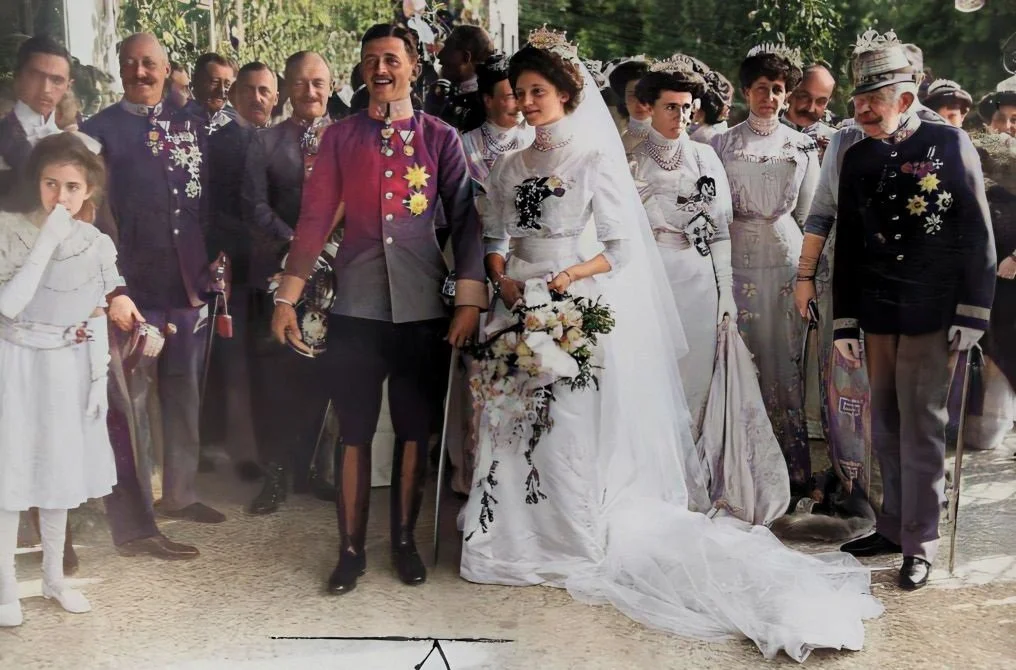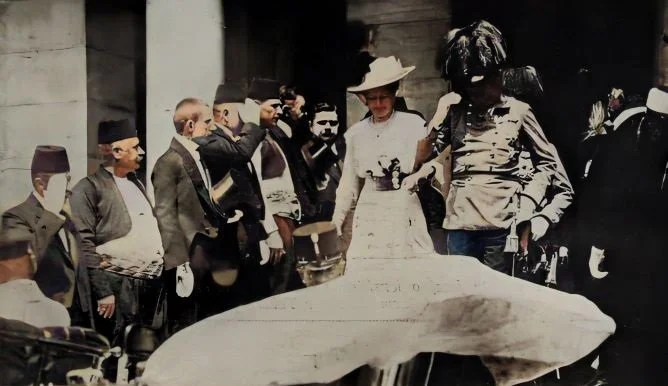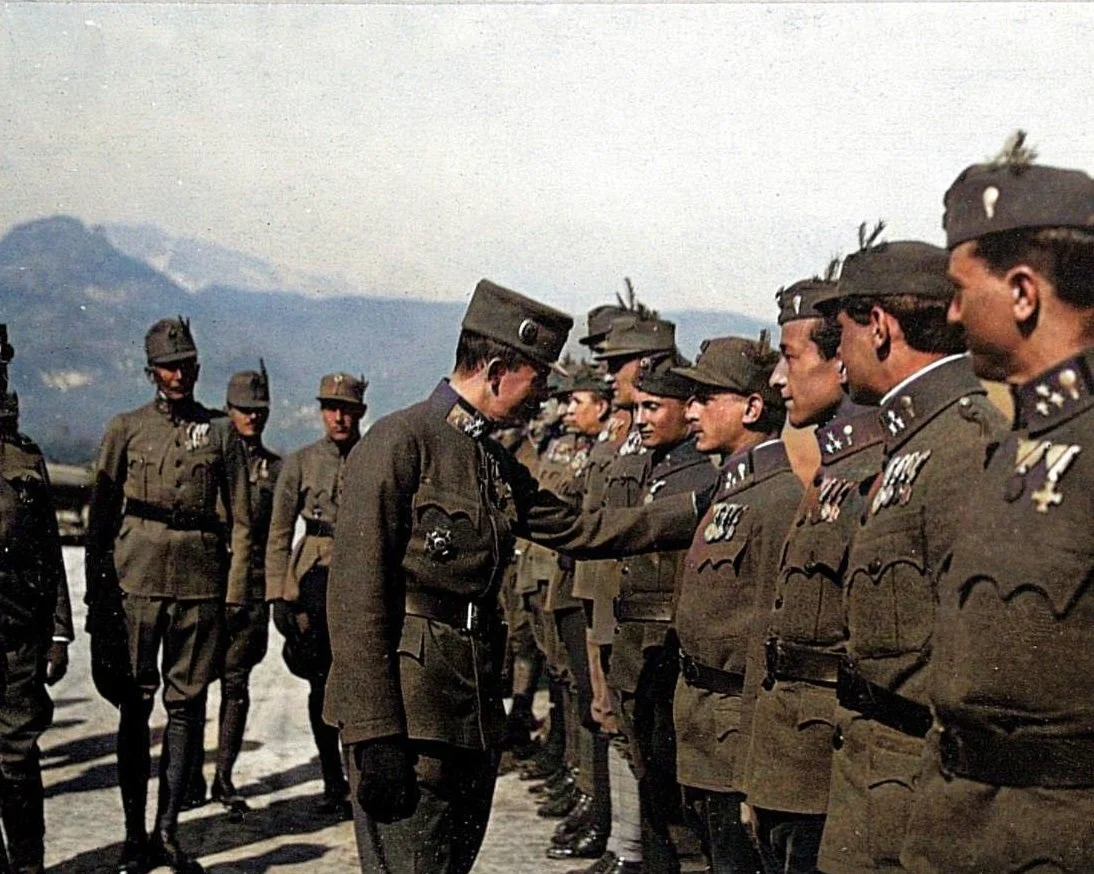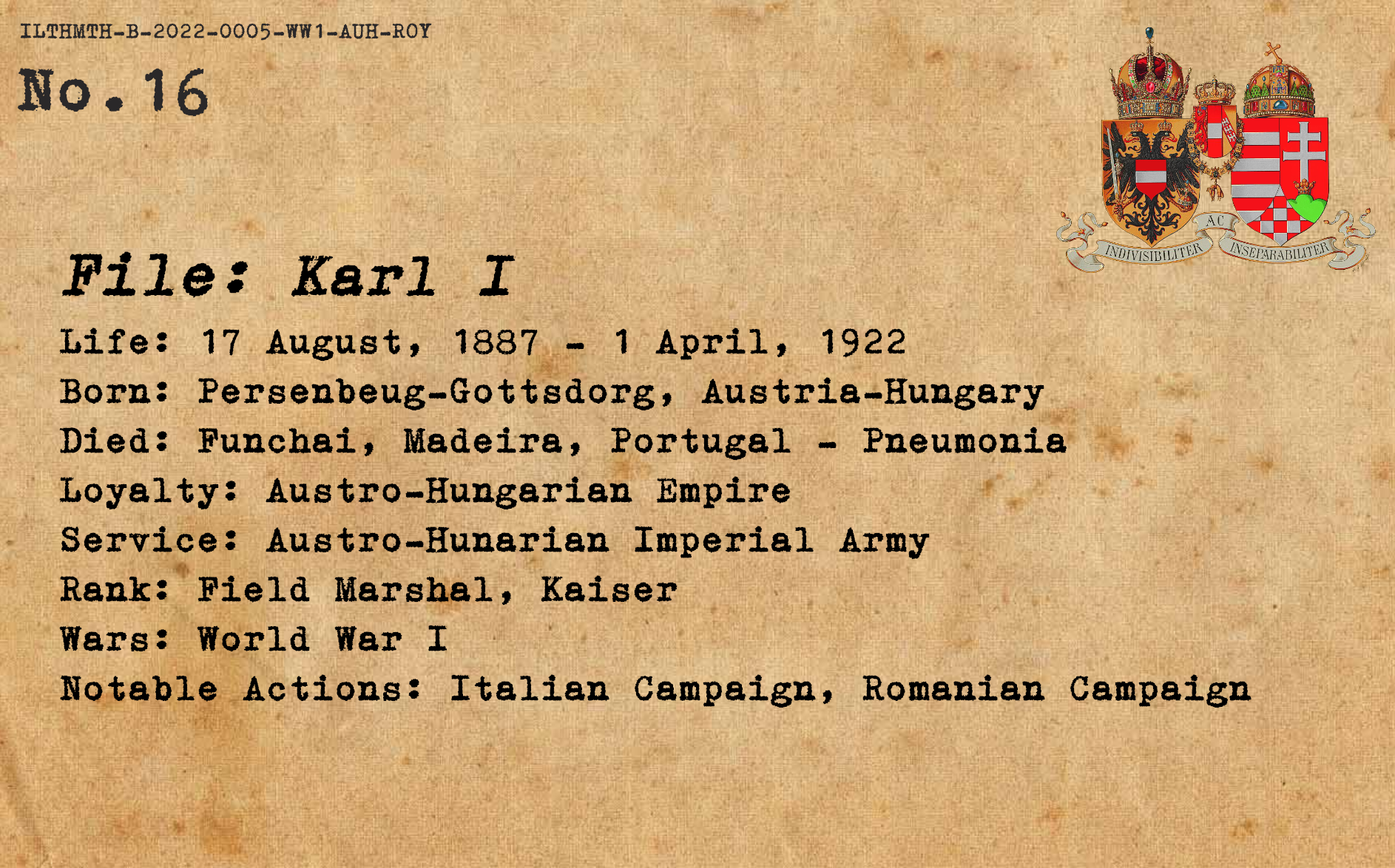Karl I of Austria-Hungary
“I did not abdicate, and never will”
The man who would become the last of the Hapsburg Emperors of Austria was born the great nephew of Kaiser Franz-Josef in 1887, son of the Archduke Otto Franz. Initially well away from the throne, a series of deaths in the Imperial family meant that in the first few years of young Karl’s life he inched closer and closer to the crown.
He would be raised to be devoutly religious, with a strong Catholic faith that would remain with him throughout his life. After a childhood following his father to various military postings and his graduation from gymnasium (a German type of secondary school) he entered the Imperial Army as an officer, where he served in various posts, generally kept distant from the governance of the Dual Monarchy due to an enmity with the heir to the throne, the Archduke Franz Ferdinand.
Karl and his wife, Zita, on their wedding day. Kaiser Franz-Josef is standing to the right
In 1909 he would encounter Princess Zita of Parma, whom he had met years earlier when both were children, and began a courtship. Karl was under pressure from the Kaiser to marry a suitable noblewoman, as Franz Ferdinand’s marriage to a commoner had resulted in his children being barred from the throne. The marriage took place in 1911, and soon produced a male heir, Prince Otto, serving well to ingratiate Karl with the Kaiser and the Imperial Court.
Archduke Franz Ferdinand approaches his car on the day of his assassination
In June of 1914, while visiting Sarajevo in Austrian-controlled Bosnia, Archduke Franz Ferdinand was assassinated by a Serbian nationalist. The resulting series of events would lead to the beginning of the First World War, as well as place Karl as heir presumptive to the throne of the now 83 year old Kaiser Franz Josef. This would lead to his promotion to the rank of Field Marshal in the Imperial Army, although his training in matters of state would be haphazard due to the war situation. He would also lead campaigns in Italy and on the Eastern Front, where he won the affection of his men despite defeats on the former front.
Kaiser Karl I with Kaserin Zita and Kronprinz Otto in Budapest after Karl’s accession to the throne in 1916
In late 1916, having only been heir to the throne for two years, he was crowned Kaiser Karl I after the death of Franz Josef on 21 November, inheriting an Empire on the back foot, as the stalemate in Italy continued and the Russian Brusilov Offensive drove back his armies in the east. Fearing the collapse of his multi-ethnic Empire, he entered into secret negotiations with the French in early 1917, which led to nothing but the effective end of Austrian sovereignty. Karl had made clear his willingness to make a separate peace, leaving Germany to fight alone, and when the French published his correspondence to that effect it led to a de facto German occupation of the country as well as a collapse in relations between the German and Austrian Kaisers.
Kaiser Karl I inspects troops in 1918
The situation continued to deteriorate in 1918, as the Americans entered into the war in force, their fresh troops bolstering the Entente forces even more than the collapse of Russia had the Central Powers. President Woodrow Wilson’s demands for autonomy of Karl’s various subjects led to attempts to form a confederation with a proclamation on 16 October, but the seeds of nationalism thus sown would prove unstoppable. This combined with policies of reform in the armed forces that angered his generals as much as they pleased the troops to lead to an ever more volatile situation.
By late October mutinies were spreading, and the Entente had promised recognition to the Czechs and an independent Slav Kingdom. A final major Italian offensive that would be known as the Battle of Vittorio Veneto saw the Imperial Armies broken on early November, with a formal armistice being signed on 3 November, 1918. The Empire was already in a state of collapse, and Karl I surrendered his authority on 11 November, although he refused to formally abdicate.
Ex-Kaiser Karl I reviews troops during his attempt to retake the Hungarian throne in 1921
The now former Kaiser left to exile in Switzerland, as the new Austrian government passed a law formally banning the presence of the old Imperial family within their lands. Despite all of this, Karl never gave up his hope to regain his throne, having never officially abdicated. He announced his intentions shortly after entering Switzerland in 1919, and set about plans to accomplish them.
When Admiral Miklos Horthy took control of Hungary in 1921, he declared himself Regent, invoking Karl’s name to legitimize his rule. This prompted the former Kaiser to travel to Hungary, but he was rebuffed by Horthy. He returned again later in the year, having amassed an army of Royalists to march on Budapest and seize the throne, but despite a promising start this would end in disaster. Some of the Royalist leaders began to have second thoughts about the reaction of the Great Powers to the return of the Hapsburgs, and two days after the attempt began Karl agreed to come to terms with Horthy as his army collapsed. Shortly afterward the Hungarian government nullified Karl’s claim to the throne, and the former Kaiser entered exile in Portugal after being handed over the British.
In early 1922 Karl fell ill during his exile on the Portuguese island of Madeira, which quickly progressed into pneumonia. He would die on 1 April 1922 at the age of 34. He would eventually come to be remembered as a man who attempted to push for peace amongst the carnage of the Great War, but was in the end not up to the challenge. He is also known in the Roman Catholic Church for his devout faith and his efforts at peacemaking, being beatified in 2004 by Pope John Paul II, one step below sainthood, as Blessed Karl of Austria.






